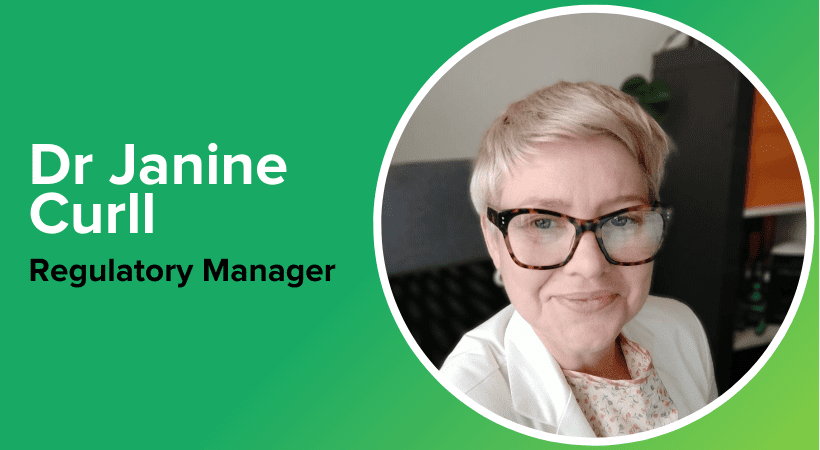Leadership Spotlight – Dr Janine Curll, Regulatory Manager
Leadership Spotlight – Dr Janine Curll, Regulatory Manager
Having spent nearly 20 years providing exceptional regulatory, legal and compliance advice and support to food manufacturers worldwide, Dr Janine Curll guides global manufacturers through the entire product development process. She assists brands and businesses with the introduction of their items to the Australian market that meet (and exceed) both commercial and competitive needs.
Janine has a true passion for product information and consumer safety and has proven expertise in the field further honed by her PhD(law) in Australia’s food regulatory compliance framework, a Bachelor of Laws and a Bachelor of Science in Microbiology, as well as extensive experience with ever-evolving EU/US food regulations.

Despite her impressive accolades and qualifications, it hasn’t always been smooth sailing. Here, Janine delves into how she established a career in the industry, and shares some of the obstacles she’s had to overcome to achieve success:
Why did you choose a career in the food industry?
“Investigative and researching roles have always fascinated me: those that demand intellectual rigour with an element of discovery.
With degrees in science (microbiology) and law, as well as experience as a freelance private investigator, the food regulatory sector became an unusual opportunity. I was keen to work at the intersection of science, law and public health.
Following a stint in London working as a scientific researcher in a ‘magic circle’ law firm practicing product safety regulation and litigation, I turned to the food industry. The NSW Food Authority was establishing at this time, and I noticed increased media attention around regulatory compliance operations on my return to Sydney. Curious, I contacted the Authority and immediately started as a food enforcement officer investigating serious breaches of Australian food safety and labelling laws.”
What has been one thing someone has said to you that’s influenced where you are now?
“Take the opportunities as they arise. Opportunities are often not what you expect.
Much of my career success has been due to my own curiosity, intrigue and wanting to learn more. I didn’t originally set out to do this role – and I never anticipated I’d have been presented with the opportunities that I have. But by trusting my gut and following my passion, a whole new world opened up to me, allowing for an intellectually stimulating and fulfilling career that incorporates all aspects of my knowledge and education.
For example, starting as a food enforcement officer nearly 20 years ago was an unexpected sidestep from traditional lawyering roles. With compliance investigations, I could apply both my microbiological knowledge and legal skills.
Plus, following my time at the NSW Food Authority, I was awarded a Commonwealth Scholarship to study a PhD, researching Australia’s food regulatory system – specifically the control of public health and safety from food fraud risks. But when commencing my studies back in the 1990s, a PhD was not in my sights.
On completion, I became a subject matter expert, published international research, and had investigation and writing opportunities I’d never dreamed would form part of my career. And I was offered an internship by the EU Food Integrity to research food fraud vulnerabilities in food systems in the Netherlands.”
Have you encountered any obstacles to pursuing a leadership role? If so, what’s been the most difficult challenge in getting to your current position?
“The Australian food industry is traditionally male-led. A factor that has been an obstacle for many female professionals within the sector. Unfortunately, I’ve witnessed, on several occasions, experienced women being overlooked for senior leadership roles in favour of less-merited men, promoted by other men of the same kind.
Personally, the way I’ve dealt with this is by not pursuing a traditional career trajectory. I’ve responded to less obvious opportunities on my journey to leadership, focusing on developing the intellectual capital valuable to employers, and becoming a skilled thought leader in my field. I successfully created my own path, by actively enhancing my own skills, expertise and knowledge through sidesteps and alternative routes.”
What do you believe workplaces should do to support women throughout their careers?
“Workplaces should offer genuine part-time positions and flexible hours – for both men and women. Not only would this ensure that working mothers aren’t excluded from progressions opportunities that allow them to achieve mutually-beneficial goals, but can allow fathers to further contribute to family duties (potentially further relieving pressures of women).
I’m delighted that these incentives are available at Ashbury, but it is something we should be seeing as the norm across the industry.”
What do you think about Ashbury’s policies and workplace culture? What have they allowed you to do that you might otherwise not have achieved?
“Ashbury is proud to promote a culture and policies conducive to healthy work/life balance. Which fundamentally supports working women (and men) who also have care responsibilities (whether that of a relative of children).
For me, flexible working has ensured I’ve been able to maintain a full-time position at Ashbury, while also being able to be a parent. In other companies, quite simply, I wouldn’t have been able to do this without reducing my hours on a permanent basis to fit within their traditional ‘working day’.”
What advice would you give to young women interested in pursuing a successful career in the food industry?
“Develop your skills in the areas that interest you the most – if you’re passionate, you will succeed. Then, learn all you can about this topic and become a subject matter expert.
Take all and every opportunity you can, and don’t be afraid to sidestep. Not all career moves have to a step up the traditional hierarchy – and don’t let anyone tell you otherwise!”
Do you think the food industry has enough female representation and/or what needs to be done to improve?
“From my experiences, I don’t believe the food industry has enough female representation – especially considering the high numbers of women who start in the sector.
That said, over the past two decades I’ve witnessed a change. Females are beginning to move into leadership roles in greater numbers. Offering women a supportive culture of fairness and meritocracy potentially enables them to take opportunities that advance their careers alongside men, allowing them to work collaboratively to achieve commercial and industry success.
With supportive workplaces, such as Ashbury, introducing and implementing flexible working policies, I’m confident the recognition of achievements of females as leaders within the global food industry will continue. And I hope that more businesses will continue to follow suit.”
Next reads
What’s Next for Food & Drink? Our Experts’ Predictions for 2026
The Peanut Diaries: School and Social Occasions
The Peanut Diaries: Navigating Social Events and Celebrations with Food Allergies
The Peanut Diaries: A Parent’s Journey to Uncovering their Child’s Allergy
Keep up to date with our latest insights
Subscribe to our mailing list to stay in touch with the latest news, insights and updates from Ashbury





